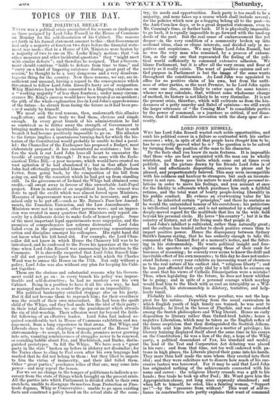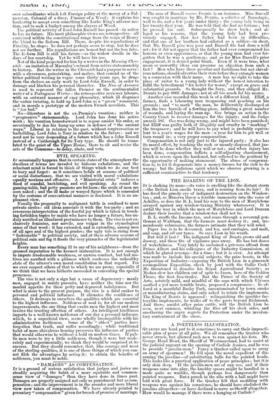LORD JOHN RUSSELL.
Wnv has Lord John Russell wasted such noble opportunities, and sunk his political career in a failure so contrasted with his earlier successes ; why, in spite of all that people have thought him to be, has he so overtly proved what he is ? The question is to be solved by turning from the position of the man to his character. By the facts shall you know its main features. It is impossible that those who are best acquainted with the man can be wholly mistaken, and there are traits which come out at times even publicly. In the picture drawn by his friends Lord John is of a kind and affectionate disposition, anxious to please and be pleased, and proportionately beloved. This may seem incompatible with his coldness and hauteur to strangers, but such an inconsis- tency is not rare. Suppose his nature to need strictly personal re- lations in order to move his feelings, and you account at once for the fidelity to adherents which purchases him such a faithful retinue, and the total want of hearty people-loving liberality in his public conduct. He evinces an overweening value for his birth ; he inherited certain "principles," and those he sustains as he would the untarnished honour of his escutcheon; his patriotism is intellectual and honorary, and is not animated by a stirring and deeply-moved regard for the multitude that lies in the wide field. beyond his personal circle. He loves "his country"; but it is the country of history, not of the living souls that people it.
Lord. John's intellect is cultivated, rather than naturally great ; and the culture has tended rather to cheek positive errors than to impart positive power. Hence the discrepancy between Sydney Smith's famous saying, that he has audacity enough to take the command of the Channel fleet at a moment's notice, and the falter- ing in his statesmanship. He wants political insight and fore- sight ; his speeches are singular among those of their rank for bareness of reasoning ; he scarcely ever seems to know the drift and inevitable effect of his own measures ; to this day he does not under- stand Reform ; every year exhibits an increasing want of clearness as to the real nature of his earliest idol, "religious liberty "; and he has just affronted that early idol by a bill which he excuses on the score that his views of Catholic Emancipation were a mistake ! Thus, when legislating for the future, he does not know whither he is going; and in spite of a 'personal courage which mayhap would lead him to the block with as cool an intrepidity as a Wil- liam Russell, his statesmanship is dilatory, tentative, and help- lessly timid. Probably his education, which was peculiar, was not the hap- piest for his nature. Departing from the usual curriculum in which English youth of high family are trained, he was sent to Edinburgh; he lived in the house of Playfair, and was educated among the Scotch philosophers and Whig literati. Hence an early disposition to literary rather than Oxford-bred habits ; hence a negative Liberalism, which may be taken as the English reflex of the donee scepticism that then distinguished the Scottish Athens. His birth sent him into Parliament as a matter of privilege ; his literary training displayed itself about the same time in his essays on the Constitution; he was a lion of the day, a hope of the Whig party, a political descendant of Fox, his standard and model ; the lead of the Test and Corporation Act debating was placed in his care ; and from that time, not too well endowed with pa- trons in high places, the Liberals played their game into his hands. They more than half made the man whom they erected into their idol ; and they were solicitous not to discern how much of his suc- cessive lustres was borrowed. For it may be said that Lord John has originated nothing of the achievements connected with his name and career : the religious liberty crusade was a gift to his hands ; free trade he took up after Peel ; Mr. Ward gave him the Appropriation-clause, not long since expressly abandoned ; and when left to himself, he cried, like a fainting woman, "Support me !"—by the "pressure from without." This want of self-re- liance in constructive acts partly explains that want of command. over subordinates which left Foreign policy at the mercy of a Pal- merston, Colonial of a Grey, Finance of a Wood ; it explains his hankering to accept even something like Locke King's adverse mo- tion, and to seek a budget among the slayers of Wood. The political activity of Lord John Russell has passed—in action he has no future. His most philosophic views are retrospective—all contained within the constitutional range from the reign of Henry the Third to the Reform Bill. There, despite his repudiations of Finality, he stops ; he does not perhaps in eon to stop, but he does not see further. His repudiations are honest but not the less false. The Reform Bill is still his future—as the widow dwells in the days of her courtship. Yet he will have his use. Not of the kind projected for him by a writer in the Morning Chro- niele--an imitation of Macaulay's retreat from active statesmanship to history. But the writer in the Chronicle had a purpose to serve : with a cleverness, painstaking, and malice, that remind us of the bitter political writing in vogue some thirty years ago, he drags from the shelves an early work by Lord John Russell, in order to damage and blacken his personal character. The Nun of Arrouca is used to represent the fallen Premier as the sentimentalist writer of a Portuguese Werter : the retrospective reviewer labours, with an outward manner of easy pleasantry, which ill disguises the unfair twisting, to hold up Lord John as a "green" romaneist, and in morals a prototype of the modern French novelists. This is "too bad."
No—literature is not the ex-Premier's vocation ; neither is "progressive" statesmanship. Lord John has done his active work ; his vocation henceforward is to repose amidst his order, or occasionally to don his hung-up arms in defence of "the ancient ways." Liberal in relation to the past, without tergiversation or backsliding, Lord John is Tory in relation to the future ; and we need not be very desponding of a future which has a John Russell instead of a Castlereagh for its Tory type. He should be trans- lated to the quiet of the Upper II-ease, there to sit and revise the acts of the Commons—to delay, abate, and veto.



























 Previous page
Previous page